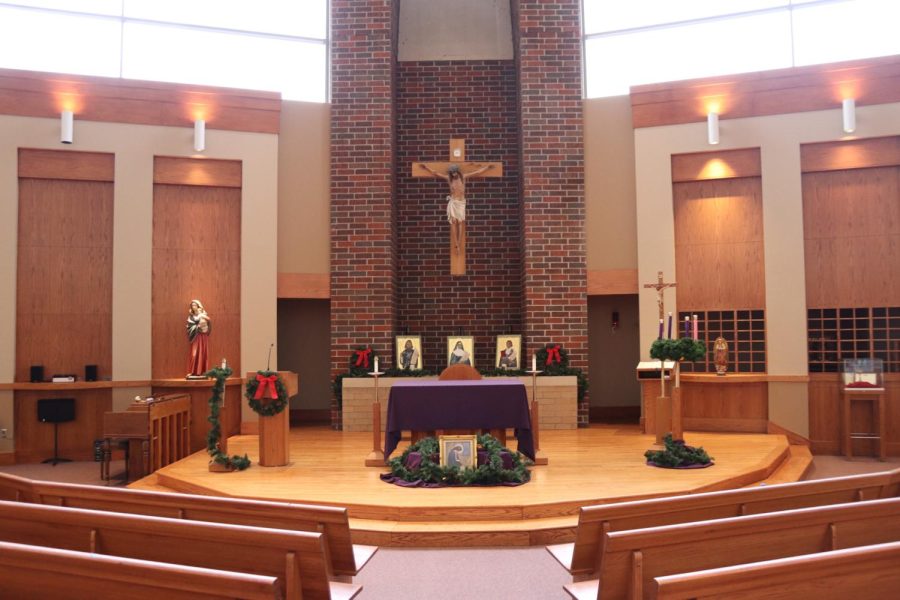Staff Ed: BSM’s religion department needs to embrace change and acceptance moving forward
How will BSM’s religion department evolve and adapt in the future, if it all?
Most simply, BSM’s Catholic identity is at the core of just about everything. This identity extends through sports, extracurricular activities, and most prominently, education. A Catholic identity at the core of BSM’s many avenues is one of the primary reasons many families choose to send their kids to BSM––key word: many. While this identity defines BSM and its community members in many positive ways, at what point does this identity extend too far?
The four-by-four, core class model that defines and outlines a high schooler’s, and even most middle schoolers’, course load is better defined as four-by-five, or six-by-five here at BSM. Starting in either seventh grade or freshman year, most commonly, theology is a fundamental part of every BSM student’s schedule. Until one reaches senior year, there is only one, predetermined curriculum available to fulfill each semester’s theology requirements, ranging from Introduction to Scripture to The Paschal Mystery to Discipleship in Society, to name a few.
While the BSM student body is predominantly Catholic, Catholic or not, theology classes are required for every BSM student. Unlike history, math, or science, where there usually tends to only be one correct answer to a question, theology classes tend to shed light and encourage personal reflection in coming to the answer that is best for you. Of course there is chronology that cannot be misconstrued, but for the most part, like faith itself, the topics discussed in theology classes are relatable, applicable, and look different in every student’s life.
Because of the individuality promoted in theology classes, students shouldn’t be graded on accuracy; rather, they should be awarded for their effort and participation in class, thus changing the grades in theology classes from letter grades to pass/fail grades at the end of a semester. If BSM truly wants their students to grow their faith in whatever direction is most suitable for them, grades should be left out of the equation, and instead an emphasis should be placed on personal growth in faith. Additionally, it’s important to recognize that for the BSM students who aren’t Catholic, these religion classes can be uncomfortable at times, leave a lingering feeling of indoctrination, and above all, feel very close minded.
It’s important to point out that BSM has done a nice job expanding the theology class offerings for seniors, giving seniors the ability to choose from a unique and diverse selection of offerings. Spirituality of Sports and Athletics, Introduction to Philosophy, and Thinking Theologically are among the new classes offered to fulfill senior theology requirements. Despite a win for seniors, this expansion in innovative curriculum is something that would be refreshing to see in the grades below as well. Many students find pleasure in being able to design a course load that is suitable for their own needs, rather than being placed into the graduation requirements because that’s all that’s available to them. This freedom and flexibility is something that all students, both Catholic and non-Catholic alike, could benefit from, and hopefully rekindle what theology classes are truly meant to embody, rather than being viewed as a graduation requirement.
It’s no secret that Catholicism is a large part of BSM’s identity, and theology classes help keep this front of mind on a daily basis. In the future, it would be revitalizing to see theology classes that represent the entire student body, which can be done through an expansion of course offerings at all grade levels, and a new emphasis on personal faith growth and reflection instead of persistent attention to letter grades and alleviating the pressure on students of telling their theology teachers what they want to hear.


















































Martin Harrington • Dec 1, 2023 at 5:32 pm
This sounds like the author is advocating for relativism. As Pope Saint John Paul II emphasized, faith and reason can coexist. Intellectual exploration within the Catholic tradition is inexhaustible. Have students design their own math and science courses and change to pass/fail grading. There is great value to a well designed core religion curriculum. Non Catholic students will gain a new perspective (diversity). Christ came and established His church: one, holy, catholic, and apostolic, for our salvation. What could be more important?